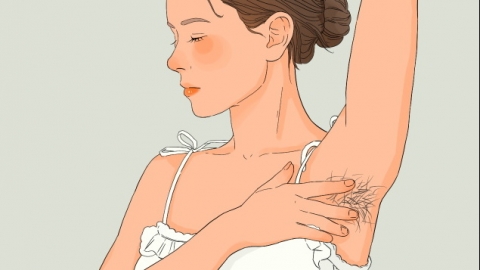What causes excessive body hair growth?
Generally, excessive body hair growth may be caused by genetic factors, puberty development, polycystic ovary syndrome, Cushing's syndrome, hyperthyroidism, and other reasons. Symptomatic treatment through general therapy, medication, and other methods is needed. If physical discomfort occurs, it is recommended to visit a hospital for examination and treatment as early as possible. Detailed analysis is as follows:

1. Genetic Factors
Hair growth and density are largely influenced by genetics. If family members have thick hair, offspring may likely exhibit similar traits. Usually, no special treatment is required; however, if appearance is affected, improvement can be achieved through trimming, shaving, or laser hair removal.
2. Puberty Development
During puberty, increased levels of androgens in the body promote hair growth, causing previously fine and soft hair to become coarse and grow faster, resulting in increased body hair. This may be accompanied by symptoms such as deepening voice, female breast development, and male muscle growth. As age increases, hair growth rate will gradually stabilize, and no special treatment is required.
3. Polycystic Ovary Syndrome
Polycystic ovary syndrome arises from interactions among genetic factors, lifestyle, and other elements. Patients often have elevated androgen levels, which promote hair growth and lead to increased body hair. Additionally, polycystic ovary syndrome may cause symptoms such as menstrual irregularities and obesity. It is recommended to follow medical advice to use medications such as progesterone capsules, dydrogesterone tablets, letrozole tablets, and others to alleviate symptoms.
4. Cushing's Syndrome
Excess adrenal corticosteroids may lead to Cushing's syndrome. Patients experience elevated adrenal corticosteroid levels, which promote hair growth and result in increased body hair. This condition may also lead to symptoms such as obesity, hypertension, and osteoporosis. It is recommended to follow medical guidance in using medications such as mifepristone tablets, bromocriptine mesylate tablets, ketoconazole capsules, and others for treatment.
5. Hyperthyroidism
Autoimmune disorders, genetic factors, environmental influences, and other causes may lead to hyperthyroidism. Patients have elevated thyroid hormone levels, which promote hair growth and result in increased body hair. Additionally, thyroid hormones may cause symptoms such as palpitations, sweating, and weight loss. It is recommended to follow medical guidance in using medications such as methimazole tablets, propylthiouracil tablets, carbimazole tablets, and others to control thyroid hormone levels and improve symptoms.
In daily life, it is recommended to maintain clean skin and avoid using irritating products to help maintain skin health.
References
[1] Xiao Chun. Investigation on the Current Status of Knowledge, Attitude, and Practice of Self-Management in Patients with Obesity-Type Polycystic Ovary Syndrome and Their Psychological Experience [D]. Hunan University of Chinese Medicine, 2022.
[2] Wu Wenya. Skin Diseases Are Not Just Skin Problems [C]//Chinese Society of Integrated Traditional Chinese and Western Medicine, Dermatology and Venereal Disease Committee. Proceedings of the 2016 National Academic Annual Meeting on Integrated Traditional Chinese and Western Medicine Dermatology and Venereal Disease. The Second Affiliated Hospital of Soochow University; 2016: 110.







